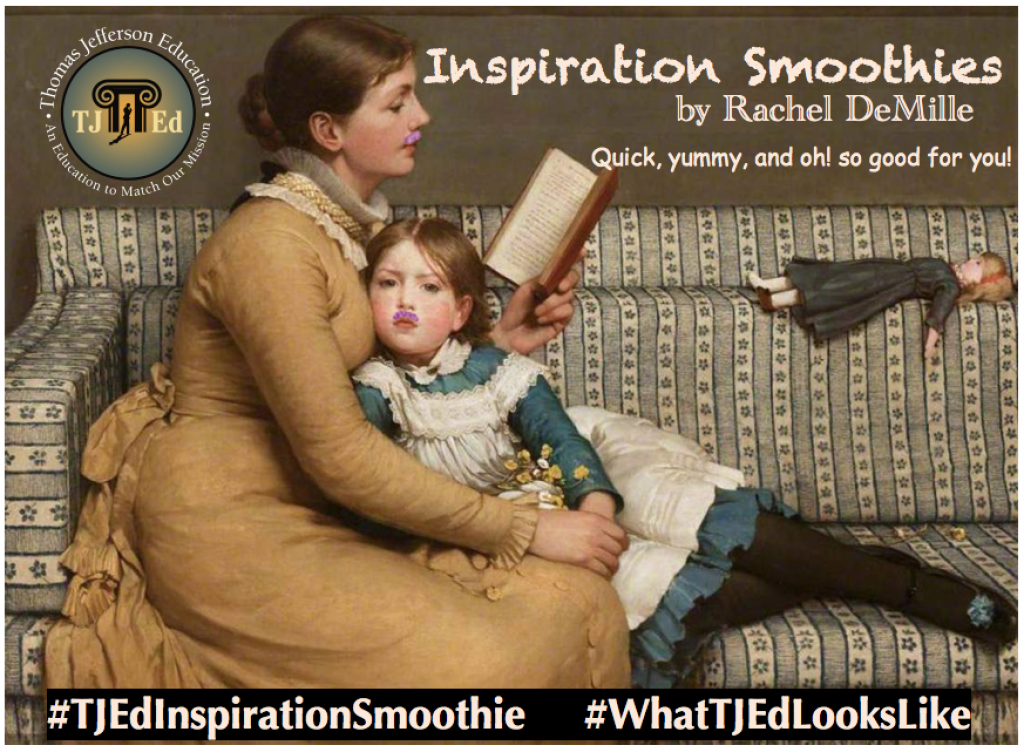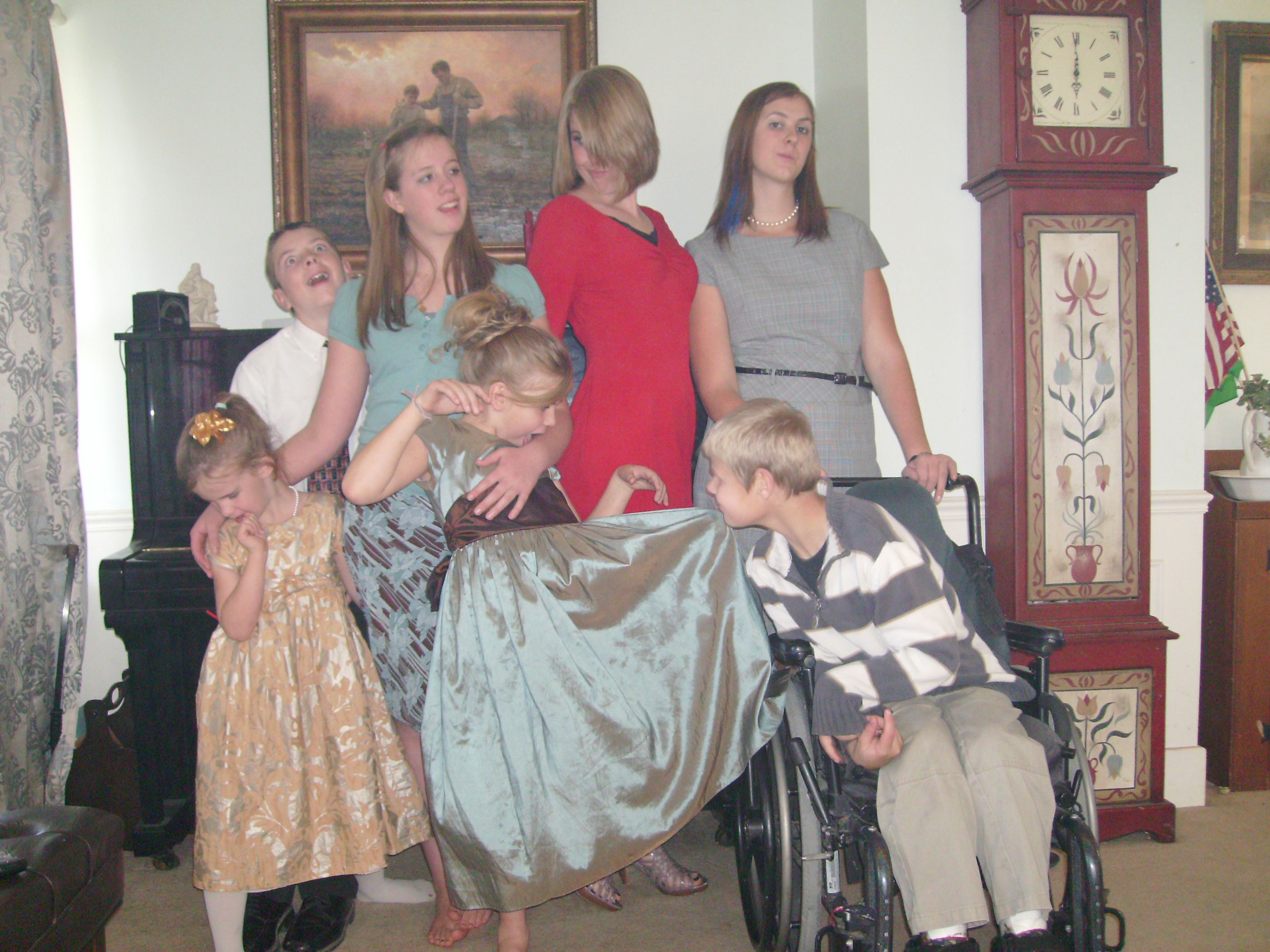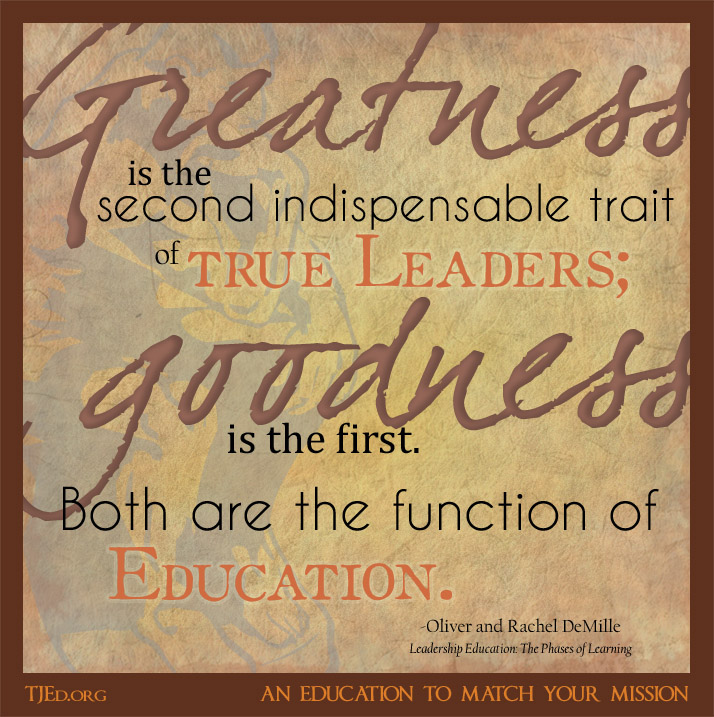

Question
 K.B. says: I’m so nervous to homeschool my daughter. She tested in GATE [Gifted and Talented Education] at school and I’m afraid I won’t be able to give her what she needs at home. Any words of wisdom, advice, etc.?
K.B. says: I’m so nervous to homeschool my daughter. She tested in GATE [Gifted and Talented Education] at school and I’m afraid I won’t be able to give her what she needs at home. Any words of wisdom, advice, etc.?
Answer
Giftedness is one of the very best reasons to homeschool! Not only can you personalize to meet your kids’ needs and interests, you don’t have to sacrifice their childhood to feed their mind or gifts.
Permit me to speak from my own experience. I will readily own that this is anecdotal, and your mileage may vary.
I was labeled “gifted” as a very young child. I started playing the piano by ear, on my own, at 3. I started reading (with my big sister’s help) at 3. I started kindergarten at age 4.
 Everything academic came very easily to me, and I got awards at school and recognition at home. I enjoyed the attention and being labeled “special.” But as I got older I felt sort of lost in it, too. In some ways I felt like people defined me by the “gifted” label that was officially assigned to me when I was tested at age 11.
Everything academic came very easily to me, and I got awards at school and recognition at home. I enjoyed the attention and being labeled “special.” But as I got older I felt sort of lost in it, too. In some ways I felt like people defined me by the “gifted” label that was officially assigned to me when I was tested at age 11.
People would come over to our home to visit and I would be introduced to them with great pride using descriptions of my academic achievements or by showing off my musical prowess or mental feats.
It left me feeling unsettled; I was proud of myself, and I knew that the attention was meant kindly, as praise – but it also felt a little dehumanizing, and I was confused about who I was and what I was for.
 As I grew, I found it difficult to “fit in” to the system that had goals for me that I didn’t understand or share, and increasingly I found that my best educational experiences were outside of the classroom–either through personal study, or with the guidance of caring and challenging mentors who modeled excellence in both character and achievement.
As I grew, I found it difficult to “fit in” to the system that had goals for me that I didn’t understand or share, and increasingly I found that my best educational experiences were outside of the classroom–either through personal study, or with the guidance of caring and challenging mentors who modeled excellence in both character and achievement.
In some ways my high school and college career appeared anti-climactic by comparison with my early show of potential. I did not thrive in school beyond elementary and middle school years. My grades were inconsistent, as I focused on the areas of my interest and passion, and neglected things I considered busy-work. I tested in the highest percentile in every class, but did not earn the grade because I didn’t turn in the work. I was remorseful and disappointed in myself, and promised myself I would do better – only to continue in my pattern of putting my best efforts into my non-school learning, or the random assigned class project that captured my fascination. I was left with a stigma I had painted on myself as an “underachiever,” “lazy,” “flaky,” etc. – simply because I didn’t do the expected thing. At that time, I didn’t consider the ways in which I was excelling; those things weren’t graded. They weren’t “approved.” It never, ever occurred to me that choosing one thing over another was not a moral question, and that my preferences were not only reasonable, but worthy. I persistently chose to get an education over being schooled, and I felt a great weight of guilt for it.
Luckily, I have a loving and supportive family, and I later came to see that my educational choices had actually been very much in line with the phases of learning, and that I had shown initiative in owning my role as a self-educator, in studying foreign languages, history, biographies, ancient texts, sciences, the arts, etc. My work with mentors and my study outside of the classroom was actually quite rigorous. And yet, it took me until I was over thirty years old to let go of the emotional baggage that I had chosen to carry with me, and more fully embrace the great lessons that had come with my challenges.
I hope that this foray into self-disclosure doesn’t seem self-aggrandizing; it is not intended to elevate myself, but rather to demonstrate that I speak from a very personal understanding of the complexities of the situation, and I feel I have some unique insight on the potential pitfalls and the opportunities that are entailed. The conveyor-belt is often faulted for allowing at-risk students to fall through the cracks. What is not seen is that even gifted children can be underserved and even (as my son-in-law said) “broken” by the system.
The Homeschool Choice
With homeschool, you can have a child be both precocious and immature, cuddly and brilliant. It’s lovely. The Phases still apply! In Core Phase they have needs that are best attended to then – even if they read at a high school level, or do mathematical calculations or compose music.
Don’t worry, mama! Set your sights on raising a great soul, keep the environment friendly to her emotional and spiritual well-being, and she’ll do a lot of the leading out in the academic stuff.
Expose her to people who achieve great things for the love of the subject so that she knows that 1) her gifts are not just carnival tricks, but have real-world application to make a difference for good; and 2) being exceptional doesn’t mean that your mind is more important than your heart. It should all be harmonious.
The Big Picture
 Just have to say: Giftedness, like disability, is actually very helpful in the big picture, because it demands that you step off the conveyor belt and really mentor the child.
Just have to say: Giftedness, like disability, is actually very helpful in the big picture, because it demands that you step off the conveyor belt and really mentor the child.
For example, our oldest is both highly intelligent, and has dyslexia. It was this amazing bag of wonderfulness that, in large part, helped me to see with greater clarity how the phases work, and how to aim for *individual* best results, which sometimes far exceed conventional timelines, and sometimes throw them out altogether.
This has served us well as our other children came along – some who had divergent learning styles, others who were natural “students” in the classroom-learning sense of the word, one with profound disabilities from brain injury. The truth is: Every child is exceptional. Our tendency to compare them and to try to make sure that they conform to arbitrary standards usually serves neither them nor us well.
 Far less stressful, far more joyful, is to take each child as she comes, and, in a loving and inspiring environment, empower her to own her education in the end. That’s what TJEd is all about!
Far less stressful, far more joyful, is to take each child as she comes, and, in a loving and inspiring environment, empower her to own her education in the end. That’s what TJEd is all about!
I actually wrote a longer treatment of how our life with TJEd unfolded, how the phases apply, and how to deal with several kids of vastly different abilities and styles. “A Thomas Jefferson Education in our Home” speaks to this journey. Enjoy. >>
Practical
I was about to get really deep about providing ideas and resources for homeschooling the gifted child, but I honestly don’t think I can improve on what Connie at LifelongLearners.com has done. I’ll link to her AMAZING post below.
For now, let me just offer a few final thoughts and ideas:
- Think Asynchronous.
Since “giftedness” is often defined as asynchronous development, be sure that your approach is also asynchronous. In other words: Your child (and your relationship with her) will probably struggle if you emphasize the gift over meeting the needs of the phase – or vice versa. There is no need (and considerable reason not to) for pushing for the fastest possible development in the gifted area. And, your child likely needs special stimulus/opportunity/resources in certain areas. Our book The Phases of Learning does a really great job of describing how to work with the asynchronous child, including the important elements of moral and emotional development, in Chapters 1-6. - Think Alternative.
 The public school model is perhaps ideal for a select few in our population, but the form is actually designed for the convenience of group learning – not for optimal individual outcomes. So don’t feel bound by what you experienced, what is commonly done, or what others expect of you. It’s one way to do things, and lots of wonderful people are happy with it – but it’s not necessarily (and probably not) the ideal for your gifted child to be in a traditional PS program full-time. Neither is it likely that “public school at home” is the optimal experience for your gifted learner.
The public school model is perhaps ideal for a select few in our population, but the form is actually designed for the convenience of group learning – not for optimal individual outcomes. So don’t feel bound by what you experienced, what is commonly done, or what others expect of you. It’s one way to do things, and lots of wonderful people are happy with it – but it’s not necessarily (and probably not) the ideal for your gifted child to be in a traditional PS program full-time. Neither is it likely that “public school at home” is the optimal experience for your gifted learner. - Think Hybrid.
That being said, you may find that there are things in your community that really can contribute to your child’s optimal experience (part time PS in a class, club or offering with a world-class mentor; service opportunities; performing arts; special arrangements with working professionals like engineers, mechanics, artists, or others to get your child hands-on experience with the “real thing,” etc.) - Think Mentors.
 Learning – no matter if a child has disabilities, is typical, has a divergent learning style, or is “gifted” – is best achieved when the child is intrinsically motivated and extrinsically inspired. Translation: The child learns when the child wants to; and the child wants to when there is a relationship of trust that invites and inspires him to engage the effort to learn. When considering options for your child’s learning, think in terms of the relationship with the mentor over the relationship with the information/skill/subject area. No kidding: I’ll take a mentor who excels in a completely different area than my child’s area of strength, and who has a passion for mentoring and constant personal growth – long before I’ll put her with someone who is strong in the subject area, but isn’t a great mentor. Hopefully you can find both. But don’t settle for a mentor who’s not progressing himself. The things such a static mentor teaches, by example, aren’t helpful – to say the least.
Learning – no matter if a child has disabilities, is typical, has a divergent learning style, or is “gifted” – is best achieved when the child is intrinsically motivated and extrinsically inspired. Translation: The child learns when the child wants to; and the child wants to when there is a relationship of trust that invites and inspires him to engage the effort to learn. When considering options for your child’s learning, think in terms of the relationship with the mentor over the relationship with the information/skill/subject area. No kidding: I’ll take a mentor who excels in a completely different area than my child’s area of strength, and who has a passion for mentoring and constant personal growth – long before I’ll put her with someone who is strong in the subject area, but isn’t a great mentor. Hopefully you can find both. But don’t settle for a mentor who’s not progressing himself. The things such a static mentor teaches, by example, aren’t helpful – to say the least. - Think You.
It’s easy to be intimidated by a child who is precocious, and feel like you haven’t got what it takes to parent/lead/mentor her. And while this is especially understandable in the case of a gifted child, please – do a reality check. Rare indeed is the child who is easy in every way. Rare indeed is the parent who feels completely competent and confident, come what may. That’s just part of the parenting gig. Resist the temptation to let the “giftedness” factor be the scapegoat for your overwhelm. There are lots of ways to achieve parenting overwhelm, and this one just happens to be yours. (Sorry – a little bit of tough love, there.) So what is my point? YOU GOT THIS. Really. It’s okay to be in over your head; we pretty much all are, in one way or another. And let’s be honest: There’s nobody, not in your local public school, not anywhere, who is an expert on your child’s situation. Not when you consider everything. So this means that you are pretty much the very-best-qualified person to oversee this crazy ride! Just do what is yours to do. By leading out as a person who makes deliberate choices for your life, a person who lives with compassion and self-discipline, with curiosity and a will to learn, who makes consistent efforts to develop in ways of your own strengths while overcoming the deficits you choose to take on here and there – you will parent your child. There are lots of people who can teach her to play the piano at a world-class level, or do advanced mathematics, or [you fill in the blank]; very few (maybe none?) of them would be candidates to parent your child with wisdom and love that helps her find the harmony between her genius and her soul. That’s something you can do.
So what is my point? YOU GOT THIS. Really. It’s okay to be in over your head; we pretty much all are, in one way or another. And let’s be honest: There’s nobody, not in your local public school, not anywhere, who is an expert on your child’s situation. Not when you consider everything. So this means that you are pretty much the very-best-qualified person to oversee this crazy ride! Just do what is yours to do. By leading out as a person who makes deliberate choices for your life, a person who lives with compassion and self-discipline, with curiosity and a will to learn, who makes consistent efforts to develop in ways of your own strengths while overcoming the deficits you choose to take on here and there – you will parent your child. There are lots of people who can teach her to play the piano at a world-class level, or do advanced mathematics, or [you fill in the blank]; very few (maybe none?) of them would be candidates to parent your child with wisdom and love that helps her find the harmony between her genius and her soul. That’s something you can do.
Conclusion
Parenting the gifted child is a challenge; homeschooling, in my opinion, makes it far more manageable. I mentioned above a fantastic, more comprehensive, treatment of homeschooling the gifted child. Check out Colleen’s blog post here >>
For help on how to lead out in your own learning, please consider the following:
- Mentoring in the Classics
- For parents of youth who need a running start: How to Mentor 7-Week Course
What have you found to be helpful in
parenting and/or homeschooling your gifted child?
Please share in the comments below!!































This was so helpful to me! Thank you Rachel! I feel reassured about my sweet and clever little boy! I also really took to heart what you shared about that overwhelm and pressure of compliments. My sweet boy is often the center of excessive praise – were surrounded by extended family and everyone is tickled by his inquisitive and talkative nature. But I am beginning to see the same reticence in him of receiving accolades. Just today Grandma brought the gift of a decorative sign that said something like “awesome mighty magnificent powerful etc superhero”. He said to me: “mom I’m not all of those things and I don’t want to be some of them”. My heart was rent for him. How difficult it must be to bear the burden of so much expectation! I truly want him to simply be good and happy. Those are what I want for him more than success and intelligence. The joy that comes from righteous living. Of course I want to see him also make a positive difference in this world. But I want it to be the difference that he can own and be happy in. I am so so happy when I see him do good things or see him choosing I learn. I feel like I should maybe try not to show excessive affection in those moments because he has begun to express embarrassment and even a desire to do the opposite simply because I’m praising him. Or is this embarrassment a normal part of development for a young man? I lived for praise as a child. I wasn’t particularly gifted though I had moments but I did like to be good and I LOVED to read. Praise is a love language for me. Maybe I just need to focus on his love language which I think is time. He’s such a delight to me! How can I hold back all this joy and pride I feel in him? Is it better to do that? What’s the principle behind this?
I think the principle is to do what is right and best for him; and as far as I can tell, you’re asking great questions to help you sort that out. I love the idea you’ve suggested – of putting considered emphasis on *his* love language. I think you can’t go far wrong with that! And I would help him find opportunities to build and lift others as a more reliable and authentic source of self-worth than the competitive/comparative continuum that always has winners, losers, haters and sycophants attached. This is not to say that his gifts should be neglected; just that they can be put in perspective of not being bestowed on him for *his* aggrandizement, but rather as a trust that he is to invest in the betterment of the world. Then his excellence is applied in a way where there is no win/lose scenario – and all are edified.
I identified with this as I was labelled gifted in elementary school. I loved the extra attention and ability to do something extra in school instead of being bored, but as I grew it felt more like I was just an early bloomer and eager learner (though I would have relished more time to study subjects of my choice!). I still did well in school but the label both made me proud/happy and gave me expectations from others I did not want to have to live up to! It is so nice when life and school can accomodate different levels of knowledge and growth!